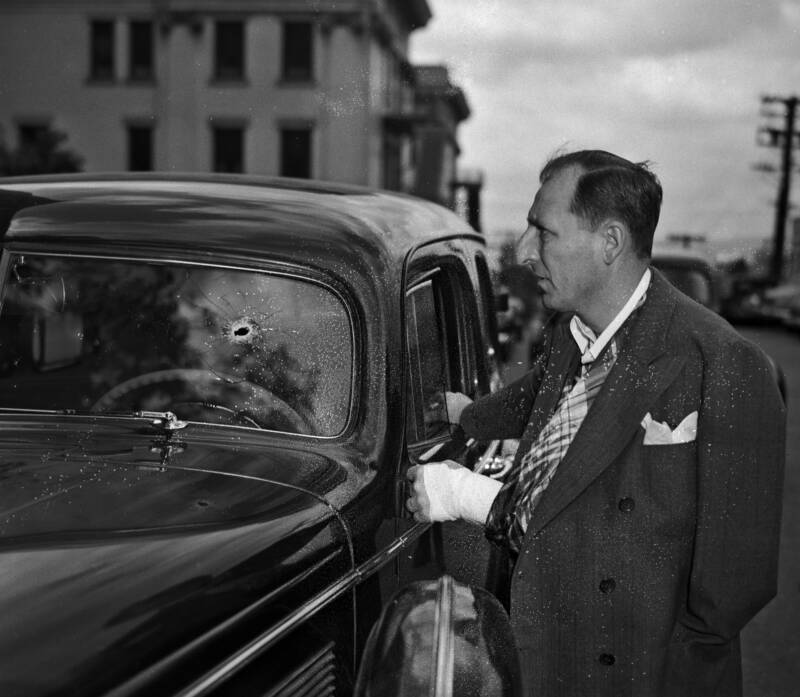Hollywood's history is replete with scandals, and the early 20th century's Golden Era was no exception. However, it took Patricia Douglas 66 years to bring full public awareness to the injustices she suffered within the industry.
In 1937, at a company party, a 20-year-old dancer named Patricia Douglas was raped by an MGM salesman. When she sought justice, the studio launched a smear campaign involving bribes, corrupt detectives, and perjury, effectively destroying her career because she dared to stand up to a powerful figure in the media.
This is the tale of one woman's fight against the Hollywood establishment, a battle waged long before the emergence of the #MeToo movement.
Patricia Douglas' Hollywood Journey
Patricia Douglas never aspired to Hollywood stardom herself; it was her mother's ambition. Born in 1917 in Kansas City, Missouri, Douglas moved to Hollywood as a child with her mother, Mildred Mitchell, who sought work as a costume designer. Meanwhile, Douglas explored opportunities in dancing.
After leaving school at 14, Douglas lived on the fringes of stardom, mingling with celebrities like Bing Crosby. Despite her social circle, she neither drank nor dated.
Before turning 16, Douglas secured roles as a dancer in classic films such as So This Is Africa and Gold Diggers of 1933.
By 1937, still living with her mother, Douglas continued to take on minor dancing gigs through major studios like MGM. It was then that she was recruited with 120 other dancers for MGM's Wild West Show, mistakenly believing the role was for a film, unaware of the true intentions behind her hiring.
Patricia Douglas said, "You're trusting with the studios. You're not expecting anything except to work in a movie. That's what you're there for."
Horror At The 'Wild West Show'
 Patricia Douglas Sued MGM After An Employee Raped Her, But The Studio Retaliated By Ruining Her Career
Patricia Douglas Sued MGM After An Employee Raped Her, But The Studio Retaliated By Ruining Her Career During a five-day convention celebrating its success amid the Depression, MGM brought salesmen from around the nation to its studios. Co-founder Louis B. Mayer introduced these salesmen to his dancers, including Douglas, under the guise of entertainment.
"These lovely girls – and you have the finest of them – greet you," Mayer told his 300 guests. "And that's to show you how we feel about you, and the kind of a good time that's ahead of you. Anything you want."
The studio supplied 500 cases of scotch and champagne for the event, dressed Douglas in a revealing costume, and applied screen-ready makeup. MGM then transported Douglas and the other dancers to an isolated lot where the celebration took place.
At the party, a 36-year-old sales executive named David Ross pursued Douglas on the dance floor. She managed to break away and sought refuge in the restroom, but Ross waited for her outside.
"I've got a man, and he's really sticking," Douglas told the restroom attendant.
Douglas was not the only one facing harassment; other women at the party also felt violated. Eighteen-year-old Ginger Wyatt expressed her frustration, saying, "I'm tired of being mauled."
 Patricia Douglas Sued MGM After An Employee Raped Her, But The Studio Retaliated By Ruining Her Career
Patricia Douglas Sued MGM After An Employee Raped Her, But The Studio Retaliated By Ruining Her Career Indeed, one waiter at the party saw "girls get up and move from the tables because the men were attempting to molest them." Another waiter said, "The party was the worst, the wildest, and the rottenest I have ever seen."
The Assault And Coverup
Despite her attempts to avoid him, MGM salesman David Ross persisted in his advances.
"He and another man held me down," Patricia Douglas said. "One pinched my nose so I'd have to open my mouth to breathe. Then they poured a whole glassful of scotch and champagne down my throat. Oh, I fought! But they thought it was funny. I remember a lot of laughter."
Feeling overwhelmed, Douglas ran to the bathroom to vomit. When she tried to leave, Ross followed her outside.
"Make a sound," Ross threatened, "and you'll never breathe again."
Ross then forcefully pulled Douglas into the backseat of a parked car. When Douglas nearly passed out, Ross slapped her, yelling, "I want you awake."
After the assault, Douglas sought help at the Culver City Community Hospital, but her ordeal only intensified there. "I was given a cold-water douche. Then the doctor examined me. It's no surprise he didn't find anything. The douche had removed all evidence."
Unbeknownst to Douglas, the doctor who examined her was known as the "family doctor" for MGM. He concluded that Douglas had not been raped.
With visible facial swelling, Douglas returned to MGM two days later. "You ought to know what happened to me," Douglas told an MGM employee, "so it doesn't happen to anyone else."
There, instead of support, MGM gave Douglas $7.50—the fee for her attendance at the party.
Outraged by the studio's disregard for her suffering, Douglas approached the Los Angeles County district attorney's office to file a complaint against David Ross.
The District Attorney at the time was Buron Fitts, who had been re-elected six months earlier despite facing indictment for perjury in a rape case. His main campaign supporter was MGM.
 Patricia Douglas Sued MGM After An Employee Raped Her, But The Studio Retaliated By Ruining Her Career
Patricia Douglas Sued MGM After An Employee Raped Her, But The Studio Retaliated By Ruining Her Career Predictably, Fitts dismissed Patricia Douglas' appeals for justice. Frustrated, Douglas eventually hired her own attorney and warned Fitts that she would approach the media if he failed to take action.
The Rape That Couldn't Be Called Rape
She followed through on her threat. However, in 1937, newspapers avoided using the term "rape." Instead, they reported that she was "ravished" at a "studio orgy."
Moreover, the press disclosed Douglas' full name and address but left MGM's name out of their coverage.
 Patricia Douglas Sued MGM After An Employee Raped Her, But The Studio Retaliated By Ruining Her Career
Patricia Douglas Sued MGM After An Employee Raped Her, But The Studio Retaliated By Ruining Her Career As the scandal made headlines, MGM launched a campaign to tarnish Douglas' reputation.
The studio enlisted the Pinkerton Detective Agency to discredit her and coerce other party attendees into denying the rape. Two dancers were coerced into labeling Douglas as "unrefined" and a habitual drinker, while another insisted the event was "a jolly affair, with lots of good clean fun."
Douglas shot back, "And since when is getting raped 'good clean fun?'"
An internal MGM memo claimed, "Douglas must have attempted to proposition men. Many of them must have turned her down but can testify to her solicitation." MGM even manipulated Douglas' doctor into falsely claiming she had gonorrhea.
The Trial Of 'Girl 27'
"Shut this down, make her stop," William Randolph Hearst wrote to Mayer. "Do you realize how damaging this is to the whole movie picture industry?"
 Patricia Douglas Sued MGM After An Employee Raped Her, But The Studio Retaliated By Ruining Her Career
Patricia Douglas Sued MGM After An Employee Raped Her, But The Studio Retaliated By Ruining Her Career When Patricia Douglas' case reached a grand jury in June 1937, Ross's attorney dismissively pointed at her and challenged the jury, "Look at her. Who would want her?"
Additionally, MGM bribed the parking attendant who had witnessed a distraught Douglas fleeing from Ross. They promised him any job he desired in exchange for denying he saw Ross at the scene. After committing perjury, the attendant secured a long-term role as a driver for MGM.
The falsehoods ultimately derailed the criminal trial, but Douglas continued her fight by filing a civil lawsuit against MGM executives. Her case stalled when her attorney abandoned her to pursue a career as a district attorney.
"It ruined my life. It absolutely ruined my life," Douglas said in 2003. "They put me through such misery."
Six decades later, Patricia Douglas revisited her ordeal, sharing her story with historian David Stenn for a Vanity Fair article. In 2007, her experiences reached a broader audience through the documentary Girl 27.
MGM had treated Patricia Douglas as if she were expendable, but she outlived all those who wronged her. Louis B. Mayer passed away from leukemia in the 1950s, Burton Fitts took his own life in the 1970s, and David Ross succumbed to rectal cancer in the 1960s.
Douglas herself lived to become a great-grandmother, passing away in 2003 at the age of 86.



















